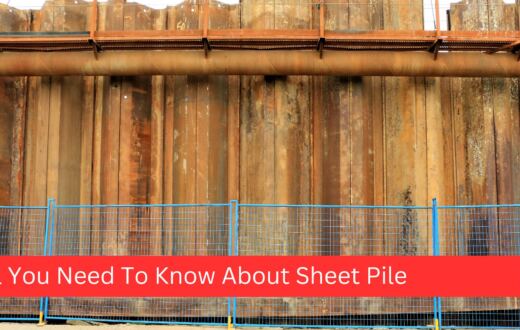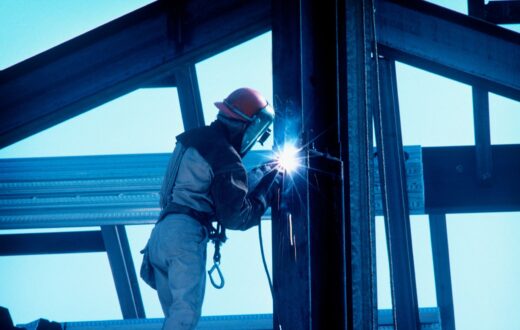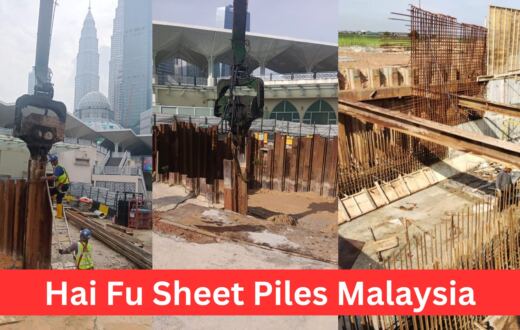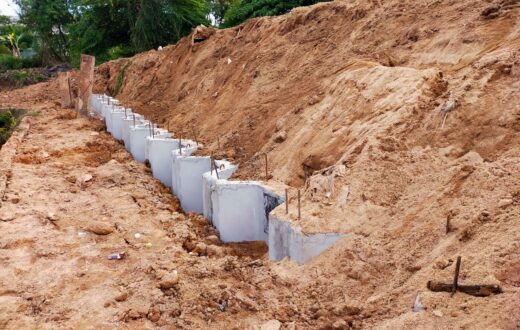Sheet pile is a popular construction method in Malaysia that is used for retaining walls, cofferdams, foundations, and flood protection barriers. It is a cost-effective solution to provide structural stability in soil and water projects. In this article, we will be discussing the different types of sheet pile available in Malaysia, their characteristics, applications, and advantages. We will also provide insights on how to choose the right type of sheet pile for your project. So, let’s dive in!
Sheet piling is a popular construction method in Malaysia used for retaining walls, cofferdams, foundations, and flood protection barriers. Sheet piles are structural elements made of steel, concrete, vinyl, or aluminum, and they are used to create a continuous wall that can be driven into the ground or installed as a free-standing structure. In this article, we will discuss the different types of sheet pile available in Malaysia, their characteristics, applications, and advantages.
- Steel Sheet Pile
Steel sheet piles are the most commonly used type of sheet pile in Malaysia. They are made of high-strength steel and are available in different shapes and sizes. Steel sheet piles are interlocked together to form a continuous wall that can be driven into the ground or installed as a free-standing structure. Steel sheet piles are versatile and can be used for temporary or permanent structures. They are also suitable for both hard and soft soils.
Advantages of Steel Sheet Pile:
- High strength and durability: Steel sheet piles have high strength and durability, making them suitable for various construction projects.
- Easy to install: Steel sheet piles are easy to install and can be driven into the ground using vibratory or impact hammers.
- Resistant to corrosion: Steel sheet piles are treated with anti-corrosion coatings, making them resistant to corrosion and suitable for marine environments.
- Recyclable: Steel sheet piles are recyclable and can be reused in other construction projects.
- Cost-effective: Steel sheet piles are cost-effective and provide a good value for their price.
Applications of Steel Sheet Pile:
- Retaining walls: Steel sheet piles are commonly used for retaining walls in various construction projects, such as bridge abutments, wharves, and bulkheads.
- Cofferdams: Steel sheet piles are used to create temporary or permanent cofferdams for marine construction projects.
- Flood protection barriers: Steel sheet piles are used to create flood protection barriers in areas prone to flooding.
- Deep foundation walls: Steel sheet piles are used to create deep foundation walls in high-rise building construction projects.
- Cut-off walls: Steel sheet piles are used to create cut-off walls in dam construction projects.
Concrete sheet piles are an alternative to steel sheet piles. They are made of reinforced concrete and are available in various sizes and shapes. Concrete sheet piles are durable and resistant to corrosion, making them suitable for marine environments. They are also used in areas with high groundwater levels and for soil stabilization.
Advantages of Concrete Sheet Pile:
- High durability: Concrete sheet piles have high durability, making them suitable for various construction projects.
- Resistant to corrosion: Concrete sheet piles are resistant to corrosion, making them suitable for marine environments.
- Environmentally friendly: Concrete sheet piles are environmentally friendly and do not require anti-corrosion coatings.
- Low maintenance: Concrete sheet piles require low maintenance and have a long service life.
- Fire-resistant: Concrete sheet piles are fire-resistant, making them suitable for fire-prone areas.
Applications of Concrete Sheet Pile:
- Retaining walls: Concrete sheet piles are commonly used for retaining walls in various construction projects, such as bridge abutments, wharves, and bulkheads.
- Cofferdams: Concrete sheet piles are used to create temporary or permanent cofferdams for marine construction projects.
- Flood protection barriers: Concrete sheet piles are used to create flood protection barriers in areas prone to flooding.
- Marine structures: Concrete sheet piles are used to create various marine structures, such as breakwaters, jetties, and quay walls.
- Soil stabilization: Concrete sheet piles are used for soil stabilization in various construction projects, such as embankments and slopes.
Vinyl sheet piles are a newer type of sheet pile available in Malaysia. They are made of polyvinyl chloride (PVC) and are available in different shapes and sizes. Vinyl sheet piles are lightweight and easy to handle, making them ideal for temporary structures. They are also resistant to corrosion and suitable for marine environments.
Advantages of Vinyl Sheet Pile:
- Lightweight and easy to handle: Vinyl sheet piles are lightweight and easy to handle, making them ideal for temporary structures that require quick and easy installation.
- Resistant to corrosion: Vinyl sheet piles are resistant to corrosion, making them suitable for marine environments and areas with high groundwater levels.
- Environmentally friendly: Vinyl sheet piles are environmentally friendly and do not require anti-corrosion coatings.
- High chemical resistance: Vinyl sheet piles have high chemical resistance, making them suitable for projects involving chemicals or hazardous materials.
- Cost-effective: Vinyl sheet piles are cost-effective and provide a good value for their price.
Applications of Vinyl Sheet Pile:
- Temporary structures: Vinyl sheet piles are commonly used for temporary structures, such as cofferdams, excavation support, and trench shoring.
- Flood protection barriers: Vinyl sheet piles are used to create flood protection barriers in areas prone to flooding.
- Cut-off walls: Vinyl sheet piles are used to create cut-off walls in various construction projects, such as dam construction and groundwater control.
- Retaining walls: Vinyl sheet piles can be used for retaining walls in softer soil conditions.
- Marine structures: Vinyl sheet piles are suitable for marine structures such as breakwaters, jetties, and seawalls.
How to Choose the Right Type of Sheet Pile for Your Project
Choosing the right type of sheet pile for your project is crucial to ensure the stability and durability of the structure. The selection process involves considering various factors, such as the soil conditions, groundwater level, project duration, and budget. Here are some tips on how to choose the right type of sheet pile for your project:
- Determine the soil conditions: The type of soil plays a significant role in choosing the right type of sheet pile. Steel sheet piles are suitable for both hard and soft soils, while concrete sheet piles are suitable for hard soils. Vinyl sheet piles are suitable for soft soils, while aluminum sheet piles are suitable for medium-hard soils. It is essential to conduct a soil investigation to determine the soil conditions and select the appropriate sheet pile.
- Consider the groundwater level: The groundwater level is another critical factor to consider when selecting the type of sheet pile. Steel sheet piles are suitable for high groundwater levels, while concrete sheet piles are suitable for low to moderate groundwater levels. Vinyl sheet piles are suitable for low groundwater levels, while aluminum sheet piles are suitable for medium to high groundwater levels. It is essential to assess the groundwater level and choose the appropriate sheet pile.
- Determine the project duration: The project duration is an important factor to consider when selecting the type of sheet pile. Temporary structures require sheet piles that are easy to install and remove, such as vinyl or aluminum sheet piles. Permanent structures require sheet piles that are durable and long-lasting, such as steel or concrete sheet piles. It is essential to determine the project duration and select the appropriate sheet pile.
- Consider the budget: The budget is an important factor to consider when selecting the type of sheet pile. Steel sheet piles are generally more expensive than other types of sheet piles, while vinyl sheet piles are the most cost-effective. It is essential to determine the budget and select the appropriate sheet pile that fits within the budget.
- Consult with experts: Consulting with experts, such as geotechnical engineers and sheet pile manufacturers, can help in selecting the appropriate type of sheet pile. They can provide insights on the soil conditions, groundwater level, project duration, and budget, and recommend the best sheet pile for the project.
In conclusion, choosing the right type of sheet pile for your project is crucial to ensure the stability and durability of the structure. The selection process involves considering various factors, such as the soil conditions, groundwater level, project duration, and budget. It is essential to conduct a soil investigation, assess the groundwater level, determine the project duration, consider the budget, and consult with experts. By following these tips, you can select the appropriate sheet pile for your project and ensure its success.





